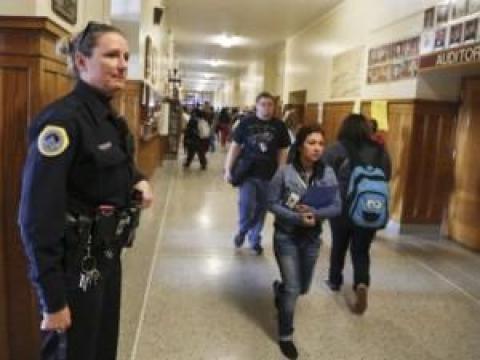Another video of a Baltimore City Public Schools police officer repeatedly, brutally, hitting a student in the face emerged last week. The school system acted swiftly to suspend the officers involved, along with the chief of school police. We laud their swift action and call for the officers, who were criminally charged this week, to be terminated. No one who treats children that way — or stands by and allows it to happen — should be permitted to work with students.
But the question we must ask is: What happens when there isn't a video? Unfortunately, we already know the answer — our kids are left unprotected from police violence. The video and these officers are indicative of a much larger, systemic problem. Study after study has shown that the presence of police in schools does not make schools safer. Instead, it increases the likelihood of students being pushed into the criminal justice system for low-level offenses; I've seen students in Baltimore charged for everything from throwing a carrot in a food fight to stealing Pokémon cards. According to a new study, the odds of a student accused of a low-level offense being referred to law enforcement in a school with a regular police presence is between 1.38 and 1.83 times higher than those without police. Another study shows that school based arrests double the probability for dropout, even controlling for all other factors like grades and previous arrest records.
In light of the devastating effects of the school-to-prison pipeline and previous cases of school police violence, our coalition has repeatedly asked Baltimore schools to implement long-overdue policies controlling the behavior of school police, to collect required data related to arrests and referrals, and to implement new training requirements. Currently, none of the 144 school police officers have any specialized training in child development or in how to deal with juveniles. They operate without explicit policies and without the same checks and balances, however minimal, that apply to city police. After a year of district stonewalling, Baltimore school commissioners recently intervened and pushed the district to move forward with the development of policies to govern the responsibilities of school police. We are hopeful that progress can be made, but the problems our city faces are not limited to police violence.
The video opens a window into the kind of school climate where administrators label students "intruders," call for law enforcement, and turn a blind eye when those same officers bash heads and abuse students. The psychological damage of police abuse in school reverberates and echoes into our communities and deep into the lives of young people. School climate, school based arrests and the criminalization of low-level misbehavior are a part of the reason that Baltimore schools have such a serious truancy and disengagement problem.
Jenny L. Egan is a public defender representing juveniles in Baltimore and a member of the Maryland Coalition to Reform School Discipline; her email is JEgan@opd.state.md.us.


Spread the word